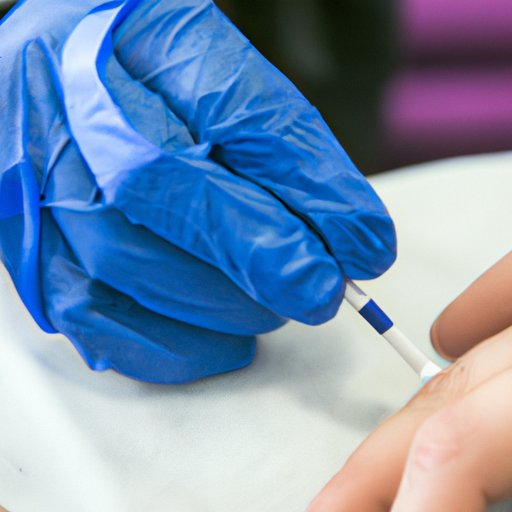
Introduction
Knowing your blood type is important for various reasons, from emergency situations to pregnancy planning. There are various ways to determine blood type, which can be performed at home or in a lab. In this article, we will discuss the different methods of blood typing, their pros and cons, and why it is important to know your blood type.
5 Common Methods to Determine Your Blood Type
The first method to determine blood type is to visit a lab or a medical professional. This involves drawing blood and performing tests that determine your blood type. While it is a well-established and reliable method, it can be expensive and requires a visit to a medical professional. Another method involves purchasing a blood typing kit from a pharmacy or online. These kits are relatively cheap, easy to use, and can be done at home. However, they may not be as accurate as tests conducted in a lab, and instructions must be followed precisely. Other methods include DNA testing, which can reveal your blood type, and relying on your family history, which may not always be accurate.
The Importance of Knowing Your Blood Type: Easy Home Tests
In recent years, easy home tests have become increasingly popular for determining blood type. These tests use a test card with a set of reagents that react to certain antigens in your blood, identifying your blood type. They are relatively inexpensive, easy to use, and can be done in the comfort of your own home. However, the accuracy of these tests can vary, and you must ensure to follow the instructions precisely to get accurate results.
Decoding Your Blood Type: A Beginner’s Guide to Typing Your Blood
Blood typing involves the classification of blood based on the presence or absence of certain antigens and antibodies. There are four main blood types: A, B, AB, and O. Each blood type has its combination of antigens and antibodies, which determine its compatibility with other blood types. Blood types are inherited and are determined by genes passed down from parents.
Discovering Your Blood Type: Hospital Procedures and Home Testing Kits
Hospitals typically determine your blood type by drawing blood and conducting a blood test. This test identifies the presence of antigens and antibodies in your blood, allowing doctors to determine your blood type. Home testing kits, on the other hand, involve the use of a test card with a set of reagents that react to certain antigens in your blood, identifying your blood type. While home testing kits can be less expensive and more convenient than laboratory tests, it is important to recognize that there may be some variation in accuracy between the two methods.
The Ultimate Guide to Figuring Out Your Blood Type: Methods and Benefits
In addition to the methods of determining blood type, it is essential to know the benefits of knowing your blood type. One of the most significant benefits is in the case of emergency situations, where knowing your blood type can be lifesaving. It can also be useful when receiving blood transfusions or organ transplants, as matching blood types is critical. If you are pregnant, knowing your blood type is important because incompatibilities between a mother and baby’s blood type can cause a range of health issues.
It is important to choose the most effective and reliable method when determining your blood type. This can be based on various factors, including cost, ease of use, and accuracy. Additionally, if you have concerns about the accuracy of the test or have questions about the results, you should speak with your doctor or medical professional.
How to Determine Your Blood Type: Tips and Tricks for Accurate Results
There are some factors that may impact the accuracy of blood typing, such as recent blood transfusions, certain medications, and underlying medical conditions. To ensure accurate results, it is essential to follow the instructions provided, do the test under appropriate circumstances, and avoid interference by any external factors. If you encounter any problems, it is essential to speak with your doctor or a medical professional.
Conclusion
Determining your blood type is important for various reasons, including emergency situations, pregnancy, and other medical procedures. There are different methods available for determining blood type, each with their benefits and drawbacks. Home testing kits have become increasingly popular in recent years, but it is important to choose a reliable and accurate method. Knowing your blood type can provide peace of mind and help ensure you receive appropriate care when needed.




